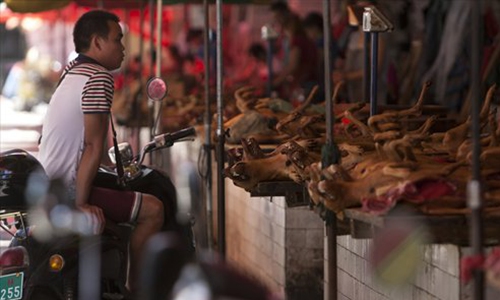HOME >> SOURCE
Company opposes canine consumption ban draft, says eating dogs is cultural
Source:Global Times Published: 2020/3/10 13:23:40

File photo: A man passes by a dog meat market in Yulin, Guangxi Zhuang Autonomous Region as the local dog meat festival nears. Photo: CFP
A dog meat processing company in East China's Jiangsu Province has opposed Shenzhen's legislation to ban the consumption of dogs, saying such a ban shows disapproval of China's food culture and that eating dogs can show "the confidence of Chinese culture."Peixian Fankuai Dog Meat Products Co made the comments in an article published on the company's official WeChat account on Sunday, according to media reports.
"Eating dogs is a tradition with more than 2,000 years of history in Jiangsu ... We should highlight our cultural confidence through the food we eat," an employee of the company told the Global Times on condition of anonymity, adding that the article was deleted due to social pressure.
He noted Shenzhen's draft legislation is only for "extreme dog lovers" instead of dog meat consumers and lacks basis in broad public sentiment.
The company said in the article that dogs, which are not wild animals, should not be included on the banned wild animal consumption list, citing the proposed city legislation would contradict national policy and regulations, as the consumption of dogs is not banned in China's Food Safety Law.
The company expressed its objection to the ban in an email sent to Shenzhen's legislative body, the employee said.
On February 25, Shenzhen in South China's Guangdong Province released a draft regulation which would fully ban the consumption of wild animals, including dogs. Shenzhen is set to be the first city in the Chinese mainland to ban the consumption of dogs.
The local legislator said the move shows the close bond between pets and their owners. As bans on the consumption of pets are a consensus of human civilization, pets should be included on the prohibited foods list, the local official said.
Shenzhen's draft came after China banned all consumption of wild animal meat in an order published by China's National People's Congress on February 24.
The ban was in response to the COVID-19 outbreak, thought to have links with a wildlife market in Wuhan, Central China's Hubei Province.
Liu Lang, head of the Beijing Association of Small Animal Veterinary Medicine, told the Global Times that Shenzhen has set a good example for other cities in China which will follow, introducing similar policies.
Most of dog meat is sourced from private breeding, sales or theft in China, Liu noted, and some dogs are slaughtered via poison, making consumption dangerous.
In addition, non-standard practices during slaughtering or processing may allow viruses or bacteria to enter the meat and affect producers or consumers, he said.
"The controversial practice of eating dog meat is an age-old one in China and can only be eradicated by law," Liu said.
According to Peixian Fankuai's website, the company was established in 1994 and its current total investment is 8 million yuan ($1.15 million).
However, enterprise information search platform qixin.com showed the dog meat processor's registered capital was only 500,000 yuan, and that the company began in 2004.
The company employee said that in 2019, the firm slaughtered about 1,000 dogs. Before 2010, that number was more than 10,000 as more and more dog lovers have since been campaigning against the consumption of dogs.
Peixian in Jiangsu has the third-highest dog consumption trade in China. People in Guangdong, South China's Guangxi Zhuang Autonomous Region, and in Northeast China's Jilin also have high levels of dog consumption and trade.
Global Times
Posted in: COMPANIES